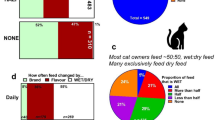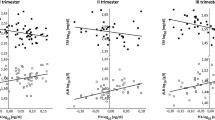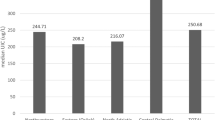Abstract
DURING a recent systematic investigation in the Netherlands, it was found that at all seasons marked differences existed between the iodine contents of milk supplied to creameries in goitrous and non-goitrous areas. The location of these areas, in general, corresponds with those found by investigations on thyroid enlargement and thyroid histology in humans and farm animals1.
This is a preview of subscription content, access via your institution
Access options
Subscribe to this journal
Receive 51 print issues and online access
$199.00 per year
only $3.90 per issue
Buy this article
- Purchase on Springer Link
- Instant access to full article PDF
Prices may be subject to local taxes which are calculated during checkout
Similar content being viewed by others
References
Brouwer, E., and Wiertz, G., Maandbl. Landbouwvoorl., 6, 486 (1949). Wiertz, G., and Brouwer, E., Voeding, 11, 227 (1950). Wiertz, G., Tijdschr. Diergeneesk., 78, 74 (1953).
Binnerts, W. T., Anal. Chim. Acta, 10, 78 (1954).
Author information
Authors and Affiliations
Rights and permissions
About this article
Cite this article
BINNERTS, W. Goitre and the Iodine Content of Cow's Milk. Nature 174, 973–974 (1954). https://doi.org/10.1038/174973b0
Issue Date:
DOI: https://doi.org/10.1038/174973b0
Comments
By submitting a comment you agree to abide by our Terms and Community Guidelines. If you find something abusive or that does not comply with our terms or guidelines please flag it as inappropriate.



